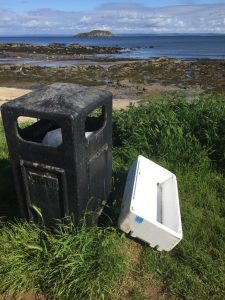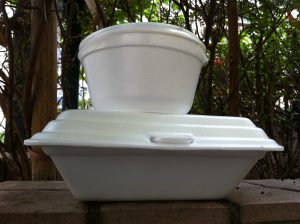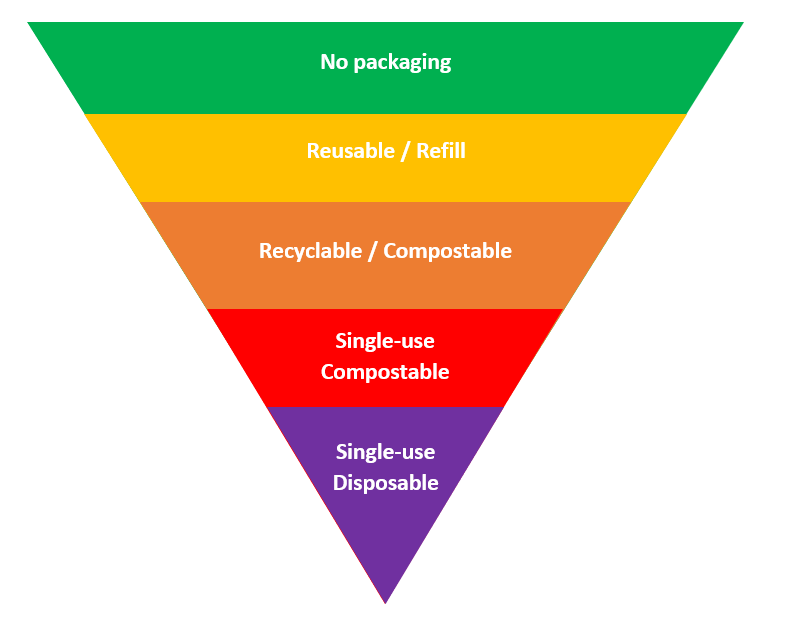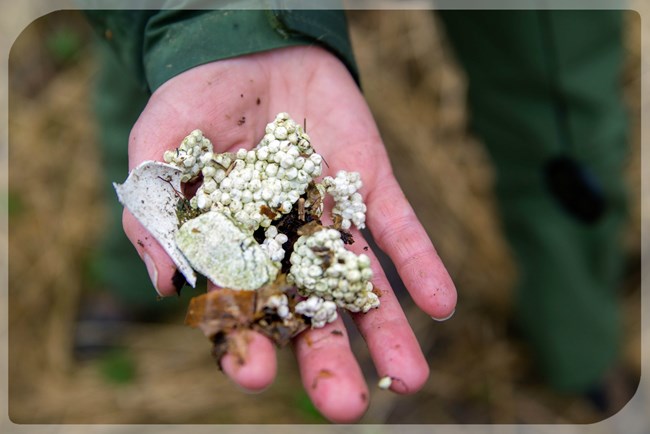Ditching Disposables
Alternative solutions for single-use food & drink packaging
Food & drink packaging in our environment
Lots of food and drink packaging used in takeaways and for commercial transport is made using polystyrene, or a mix of material such as card lined with plastic, or a material such as paper with a waterproof chemical coating. Polystyrene may be expanded polystyrene (EPS), also known as the trademark Styrofoam, or extruded polystyrene (XPS).
For example polystyrene is commonly used for takeaway chip boxes and to transport food products such as fish, disposable beverage cups tend to be made of a card outer with a plastic lining, and takeaway food is often put into paper bags or boxes with an impermeable coating. These materials are used because they are strong and versatile to protect the contents, and can be effective in keeping food and drinks warm or cool for longer if needed.
Problems preventing recycling
Whilst plastic, polystyrene and single-use packaging are really convenient for takeaways, meals on-the-go and commercial transport of food products, they are not good for our environment. Both polystyrene and plastic linings in paper cups are made from oil, requiring fossil fuels to be extracted and processed. Once made into our disposable packaging, the plastic, paper and polystyrene often can’t be recycled because of contamination from food and drink. Plastic-lined paper packaging is either impossible or very difficult to recycle due to their mix of materials. As a result, much of this waste will go straight to incineration or landfill where it could remain for over 500 years as these items do not easily breakdown.
Plastic and polystyrene not only pose a risk to the environment because they don’t break down but they also contain harmful chemicals. Paper packaging can contain harmful chemicals such as PFAS that can contaminate the environment, and recycled products. Food and drink packaging makes up a significant proportion of litter in both urban areas and in beauty hotspots like Fidra’s hometown of North Berwick, posing a risk to wildlife from ingestion, entanglement and the chemicals they contain.
Harmful chemicals in packaging
With growing public concern about plastic pollution, especially in coastal areas, Fidra recognises that more businesses are moving away from polystyrene and plastic packaging, with many opting for either paper and board or compostable alternatives. Whilst Fidra celebrates this transition, such food containers can have a chemical coating, made from PFAS (poly or per-fluorinated alkyl substances), which provides a grease- and water-resistant barrier. Despite health and environmental concerns about a number of chemicals used in paper and board Fidra believe there is insufficient regulation of paper and board food contact materials and the chemicals they contain.
Take a look at our project on PFAS and work on preventing chemical pollution for more information.

Read our latest report assessing a range of alternatives to polystyrene fish boxes:

Read our Packaging Position Paper to find out more about our stance:

- Fidra recommends that packaging is only used where necessary. An example of this would be for supermarkets to sell fruit and vegetables loose rather than in plastic or compostable packaging, whenever possible.
- Where packaging is needed Fidra recommends reusable containers that can be (re)filled in shops and takeaways to avoid the use of compostable, recyclable or disposable packaging.
- Where single use packaging is unavoidable Fidra recommends packaging that can be successfully recycled or composted, avoiding waste going to landfill or incineration. It is important that such products have no harmful chemical content which would contaminate compost or products made from recycled content.
- Where single use packaging cannot be recycled or composted (e.g. due to current lack of infrastructure) Fidra would recommend the use of compostable items with no intentionally added chemical contamination. Fidra believe compostables are preferable to non-recyclable plastics which can have greater negative environmental impacts due to their non-renewable source, and further negative impacts when incinerated or when sent to landfill.
- Fidra’s least favoured option is single-use disposable, non-compostable products, such as items made from or lined with fossil fuel-based plastics. These should be a last resort and every effort should be made to minimise their use.

Polystyrene from the marine environment.
The ingredients…
There are issues with polystyrene and plastics throughout their life-cycle from production, to use and once it is thrown away. Polystyrene is a kind of plastic and like most plastic it is made from petrochemicals (fossil fuels). A key ingredient of polystyrene is styrene, which is a potential carcinogen 1, and can be released into the atmosphere and natural environment during the life of the product, resulting in environmental pollution and occupational health exposures. Polystyrene is also highly flammable and hazardous if not stored properly.
Impacts on nature…
Once plastics are made into items like takeaway cups and boxes, the chemicals in them can leach out 2 and be ingested by the consumer and animals in the environment. In addition, ingestion of microplastics by wildlife has been well documented, with microscopic plastic particles being confused as food.
Surveys by the Marine Conservation Society have shown plastics and polystyrene to be a consistent component of coastal litter over the last decade 3. Additional compounds and chemicals added to plastics during production, have the potential to enter the environment either by leaching from landfill or through the degradation of litter on land, in waterways and in the sea 4. Polystyrene and other plastics in the marine environment also adsorb pollutants from seawater, which creates an additional hazard to the additives already present and their degraded products 5.
Waste streams…
Polystyrene and mixed material products are not easy to safely or responsibly dispose of, often ending up in landfill or being incinerated. Even where recycling facilities are available, much of the material will have been contaminated by food, drink and grease making it unsuitable for recycling.
Considering compostables, reusables and recyclables for consumers
Working with the local businesses, community groups and residents in North Berwick, the town we are based, Fidra are looking into alternative options to the current materials being used in takeaway food and drinks receptacles. By working alongside all relevant stakeholders, we hope to find a suitable scheme that reduces, and indeed eradicates, these unsustainable and harmful materials being used in the town for takeaway items.
One option is for businesses and residents to ditch disposables and opt for reusable food and drink containers as much as possible. Fidra are excited to be part of a trial of reusable deposit-return coffee cups, whereby a small deposit such as £1 is paid in a cafe for a reusable coffee cup, which can then be returned to any participating cafe or business in North Berwick for the return of the deposit. Delayed due to to Covid 19, this should be taking place in 2022.
In addition, businesses and residents alike can lead by example and reach for their reusable cups and containers when they stumble to the commuter train in the morning or head to the harbour for chips in the evening.
Another option is for North Berwick to become an exemplar in using compostable food packing, where single-use packaging is unavoidable. Compostable products are made from a wide variety of raw materials, such as corn-starch, which are often waste products themselves. If disposed of correctly – in a food waste stream or through industrial composting – these items will biodegrade and will not be contaminated by leftover food.
Although there are significant logistical challenges to this option, if set up well and with commitment from local businesses, communities and tourists alike, we feel that this would be a suitable and viable option for North Berwick. The Waste (Scotland) Regulations 2012 require that from the end of 2016 all business and organisations that produce over 5kg of food waste a week in urban locations, must segregate this as a separate waste stream. In time, this will include any biodegradable waste being sent to landfill by 2025. Establishing an effective system in North Berwick as soon as possible will provide the option of using disposable containers made of compostable materials.
Working with industry
The use of polystyrene fish boxes and alternatives has been researched by Fidra as part of its work on the impacts of Scottish salmon farming. Fidra’s work shows that a range of reusable and single-use options are available as alternatives to polystyrene, with different options suited to different parts of the seafood supply chains. Find out more about the available alternatives to polystyrene fish boxes.
Working with retailers
As well as looking for local solutions that may work in other communities or on a large scale we are also working with retailers to reduce the chemical burden on our environment that comes from food packaging. Find out more about our work to get ‘forever chemicals’ PFAS out of your packaging.
Inputting into Policy
Fidra work on policy and legislation in Scotland, the UK and EU. We have supported a deposit return scheme in Scotland, we have called for better protection from harmful chemicals in food contact materials and we have advocated for reform of extended producer responsibility schemes in the UK.
Local businesses team up to ‘close the loop’
Vegware’s Close the Loop system, which collects food waste and compostable packaging to convert to compost to be used on soil, has been taken up by two independent businesses, Steampunk Coffee Roasters and Archerfield Walled Garden. Both have found that using the system has encouraged them to examine their waste streams and make changes that have saved costs.
Elly Douglas-Hamilton, Director of Archerfield Estates Ltd, comments “Working together with other local businesses like Steampunk means that we can share information and ideas and start translating these ideas into practical reality. I hope this is something we can encourage other businesses in doing and help us all to realise that perceived barriers are perhaps not as great as they seem.”
Shrewsbury Cup
Shrewsbury Cup is a Community Interest Company set up to eliminate single-use cups in the town of Shrewsbury. The concept is simple: Customers pay £1 deposit for a Shrewsbury Cup, enjoy their drink and then return the cup to any of the 20 participating cafés to get their £1 back.
New York 6
In January 2019, a law preventing the use of polystyrene products came into effect in New York City, banning food service establishments, shops and manufacturers to possess, sell or use EPS products, such as food and product packaging.
The Director of the Mayor’s Office of Sustainability, Mark Chambers explained “This is a pivotal and long-overdue step to protect New York City from the unnecessary damage Styrofoam does to our streets, water, and people.”
Seattle 7
Since 2009, when Seattle’s ban on the use of EPS was introduced, the city has continued to lead by example on the battle against single use food packaging and items. A further ban on non-recyclable and non-compostable food packaging was brought into effect in 2010, and the introduction of a ban on all plastic straws and cutlery in July 2018 demonstrated their continued commitment.
The City of Seattle require that all food service businesses use either compostable or recyclable alternatives, provide suitable bins for staff and customers to dispose of these products in, and are signed up for their waste to be collected by a collection service provider.
Scotland’s ban on single-use plastics is laid in legislation
The positive news of Scotland’s ban on a range of single-use plastic items including expanded polystyrene food containers and cups is covered in Fidra’s blog Bans and beach cleans bring ocean optimism.
Assessing alternatives to polystyrene fish boxes
Fidra’s blog on alternatives to expanded polystyrene (EPS) fish boxes provides a summary of the work done with environmental consultants TAUW to compare the range of products available.
Extended Producer Responsibility (EPR) explained
Fidra’s blog on Extended Producer Responsibility, or EPR, explains how the concept could be a valuable tool in the box of solutions to packaging pollution.
Choose Reuse
With increasing refill and reuse schemes developing around the world, Fidra reflect on the growing options available in this blog on how to ditch disposables and join the choose reuse revolution.
Single-use in Covid times
Read our blog on the impacts of the coronavirus pandemic on single-use packaging. Despite initial fears of the virus spreading via objects there is little evidence that it does.
Call to ditch polystyrene fish boxes for the Year of Coasts and Waters
With 2020 allocated as the Year of Coasts and Waters, Fidra’s new year blog calls for businesses to ditch polystyrene fish boxes. A brief information sheet gives a starting point for this important action.
Waste Expectations event with North Berwick businesses
To assess the needs of North Berwick businesses and possible solutions to their takeaway food and drink packaging, Fidra organised a workshop with local community groups and businesses, East Lothian Council, Resource Efficient Scotland and Vegware. The overwhelming outcome was a desire from businesses for reusable solutions. Read the outcomes of the event in Fidra’s report Waste Expectations: Trash Talk With Businesses.
Fidra (2021) Assessment of Alternatives for EPS Fish Boxes
Fidra worked with environmental consultants TAUW to deliver a report comparing polystyrene fish boxes to a range of alternatives.
Fidra (2021) Compostable packaging: replacing fossil-based plastics in single-use takeaway food and drink containers
As part of its work into alternatives to polystyrene takeaway food and drink containers, Fidra examines the feasibility of using compostable materials. In particular the possibility of a small town such as North Berwick using it for multiple businesses was researched. The outcomes are presented in a Discussion Paper on compostable alternatives for takeaway food packaging.
Fidra (2020) Forever Chemicals in the Food Aisle
There is little accessible information about the chemicals in our products. To address this we carried out independent analysis and we found PFAS in packaging from 8 out of 9 major UK supermarkets, and 100% of UK takeaways tested. Full details of our sample selection and research findings are available in our Forever Chemicals in the Food Aisle report.
Fidra (2019) Packaging Position Paper
Fidra’s Packaging Position Paper presents a distinctive packaging hierarchy as a guide to the order of preference for several categories of packaging, including single-use and reusable options.
Fidra (2019) Waste Expectations: Trash Talk With Businesses
To assess the needs of North Berwick businesses and possible solutions to their takeaway food and drink packaging, Fidra organised a workshop with local community groups and businesses, East Lothian Council, Resource Efficient Scotland and Vegware. The overwhelming outcome evident in the report Waste Expectations: Trash Talk With Businesses was a desire from businesses for reusable solutions.
1 National Toxicology Program, Department of Health and Human Services: Report on Carcinogens, Fourteenth Edition. https://ntp.niehs.nih.gov/ntp/roc/content/profiles/styrene.pdf
2 Manalac et al(2010) Leaching behaviour of sulfonated polystyrene (SPS) from recycled Styrofoam. International Journal of Environmental Science and Development, 1(4), 368-370.
3 Marine Conservation Society UK: http://www.mcsuk.org/downloads/gbbc/2016/GBBC_2016_Report.pdf
4 Rani et al (2014) Hexabromocyclododecane in polystyrene based consumer products: An evidence of unregulated use. Chemosphere, 110.
5 Takada H, Mato Y, Endo S, Yamashita R, Zakaria M (2006). Pellet Watch: Global monitoring of persistentorganic pollutants using beached plastic resin pellets. Marine Pollution Bulletin, 52 (12), 1547-8.
7 Seattle.gov: http://www.seattle.gov/util/forbusinesses/solidwaste/foodyardbusinesses/commercial/foodpackagingrequirements/
